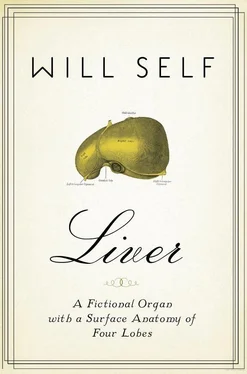Over the course of a month Joyce’s walks grew longer and longer. It was difficult for her to deny to herself that this erect figure in a neat tweed suit and good walking shoes, who crunched over pebbles and skipped across puddles, was a very sprightly lady for her age. On the day she was due to go into town for the results of the medical examinations to which she had submitted, Joyce walked all the way to the top of the hill — feeling not the slightest shortness of breath — then over its thinning brow.
The spires of the Grossmünster and the Fraumünster stood down in the valley, stonily lonesome pines . The cloud lay down on top of the Uetliberg — a mauve-grey muff. She walked on along the ridge to the gates of a cemetery. It was only after noticing the words Friedhof Fluntern cut into the blocks of the wall that Joyce realized the trim cinder path, disappearing down an avenue of silver birches, led to her own grave.
Judex ergo cum sedebit, Quidquid latet apparebit, Nil inultum remane-bit. When therefore the Judge takes His seat, Whatever is hidden will reveal itself, Nothing will remain unavenged . Her mother had died before her father, clawed apart by the crab in those pinched years after the war. The tears were creamy on her father’s synthetic face by the graveside. Joyce had been twelve, a bad age for a girl to lose her beloved mother — perhaps the worst. Later on she did not lack insight, understanding that this experience — being forced to mother her father and her younger brother — had helped to make of her a tyrant when it came to self-reliance and Best Emotional Practice.
Joyce had had high expectations of the interviews with the Papal Chaplain and Father Grappelli. She had hoped that even the lawyers engaged by the diocese to pursue her claim to Asylberechtigung — and the public relations consultant that they, in turn, had taken on to give currency to this politically sensitive case — would prove interesting interlocutors. The notion of a contemporary miracle was, she thought, so bizarre that anything connected with it would take on a diverting hue.
This was not so. Instead, shiny blue and black suits in the monotonous ambience of corporate offices. His subtle fencing upon their first meeting at Vreni Stauben’s dusty apartment had, Joyce realized, been Monsignor Reiter’s play for her — body and soul. Now he had her, she was subjected to a celibate’s passionate indifference. In place of that delicious worldliness they had fleetingly enjoyed in each other, they sat either side of the Bishop’s desk, surrounded by filing cabinets that could have belonged to any organization.
The long, thin prelate was coiled into a swivel-chair. His flared soutane and purple sash — which, in a domestic context, had struck Joyce as charged with exoticism — were here diminished: not-so-fancy dress. The biretta sat on the blotter, the toy of God’s executive. And so the Papal Chaplain examined her, his questions derived from a pre-printed sheet.
There were interviews alone with Reiter, and also ones with the Monsignor and Father Grappelli, who, it transpired, was to amend the first diocesan report on Gertrud Stauben so as to incorporate the evidence of Joyce’s recovery — and recover she definitely had. The results of the exhaustive testing undertaken at the university’s Kinderspital on Steinwiesstrasse had been conclusive: the tumour in Joyce’s liver had radically contracted. Comparing her blood test results with the records obtained from Phillimore at the Mid-East, the medics — although not oncologists — could definitively establish that once more the body’s chemical refinery was working at full capacity: tidying away glycogen, synthesizing vital plasma proteins and emulsifying lipids to produce crucial, digestion-aiding bile.
When he saw these data, Reiter allowed himself a rare quip: ‘The liver is the body’s saviour, no? After all, it is the one organ that can fully regenerate itself — be born again. Your liver, Joyce, well, it has risen from the dead.’
But Joyce was not wandering in the dewy garden of Gethsemane, clad all in white samite; she was trapped beside a filing cabinet as massive and grey as any boulder, looking at a calendar of the Dolomites.
Father Grappelli was preoccupied by one thing alone; had Joyce touched — or been touched by — either himself or Ueli Weiss on the evening they had all met for the first time? Joyce thought it rather crass that an omnipotent super-being should work through such clumsy agents and crude methods; touch, prayer — what were these? Surely, mere metaphysical sleight-of-hand combined with wishful thinking — no great marvel when compared to the blinding complexity of the largest organ in the human body, with its million-plus lobules, through which the life-blood percolated, via the very fenestrae , into a thousand sinusoids.
The parish priest’s English wasn’t good enough for him to interrogate Joyce alone, so Reiter acted as interpreter. Again and again they anatomized the encounter outside the chapel beside the Lindenhof. Joyce remembered the open doors, the overgrown Christ child, Weiss’s showy coat and edible hair — these were the things that had lodged in her memory. There had been verbal shuttlecocks flicked across the language barrier, but whether English stroke had followed through on to Swiss hand. well, the more they peered into the dim recency, the more opaque the run of play became: Joyce saw Weiss’s suede gloves slapping on his open palm — had he also, perhaps, touched her arm?
Like a student confined to a library, Joyce found it impossible to concentrate, and it was visions of a sexual kind that came to her. She was surprised — although not immoderately. Whatever people might assume , she hadn’t been wholly quiescent during her five years of widowhood; there had been one brief affair. Derry had been a carnal man, and even when ill-health had brought about the diminuendo of his own desire, he still desired hers. In life, the conversation of their bodies had been exclusive, yet open-ended: he did not seek to possess his wife from beyond the grave.
She hadn’t been expecting it, but two years after Derry died she was ambushed by the leisurely urgency of reawakened lust. However, worse than an unfamiliar body, she thought, would be its revelation. Strange clothing discarded on a well-known chair, the alien tang and slack tone of a distorted musculature. Yet it wasn’t these, but the very companionability of his caresses that had made her cease to want them. Why bother to get undressed when there was as much intimacy to be gained in front of the television? It was irrelevant whose the body had been — a widower’s, of course, one of their old circle. She still saw him from time to time. There were no hard feelings; after all, there hadn’t been any in the first place; and that, Joyce concluded, was the essence of desire — it was all hard feelings.
Now, here, with the two priests in the Bishop’s office, the feelings were hard, hard as lust before the climacteric. Joyce sensed a hot flush rouging her face — have they noticed? Most disconcerting of all, it was Ueli Weiss who mounted this ambush; Weiss’s body that she wanted to see, flayed of its bourgeois woollen skin; Weiss’s unkempt moustache tickling. my belly? Healthy blush-blood jetted from Joyce’s hepatic veins, through her inferior vena cava, into her heart, into her hot head, round and round. This — this had been one of the conversations the crab had scuttled her away from: the delirious gabble of arousal.
That afternoon Joyce left the diocesan office and, instead of taking the tram home, walked over the Zürichberg again. As she paid out her thread of orientation from the old town to Oerlikon, she thought on this: there had already been a small item in Neue Z ü richer Zeitung by a sympathetic journalist. Nothing showy — the Church was playing its hand close to its chest — still, enough to create some impetus. There was to be a meeting called by the Christian-Democratic Party in the canton. A follow-up editorial in the same newspaper had proposed another referendum on assisted suicide, singling out Dr Hohl’s organization for especial censure — and, in particular, the move to offer clinical depressives their service.
Читать дальше












